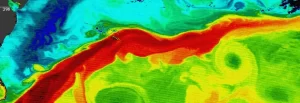Data confirms robust weakening of the Gulf Stream
A recently published study in the journal Geophysical Research Letters has revealed that the Gulf Stream transport of water through the Florida Straits has weakened by approximately 4% over the past 40 years. Researchers state with 99% certainty that this is more than what would be expected from random variations, marking the first definitive evidence of significant change in the current.

